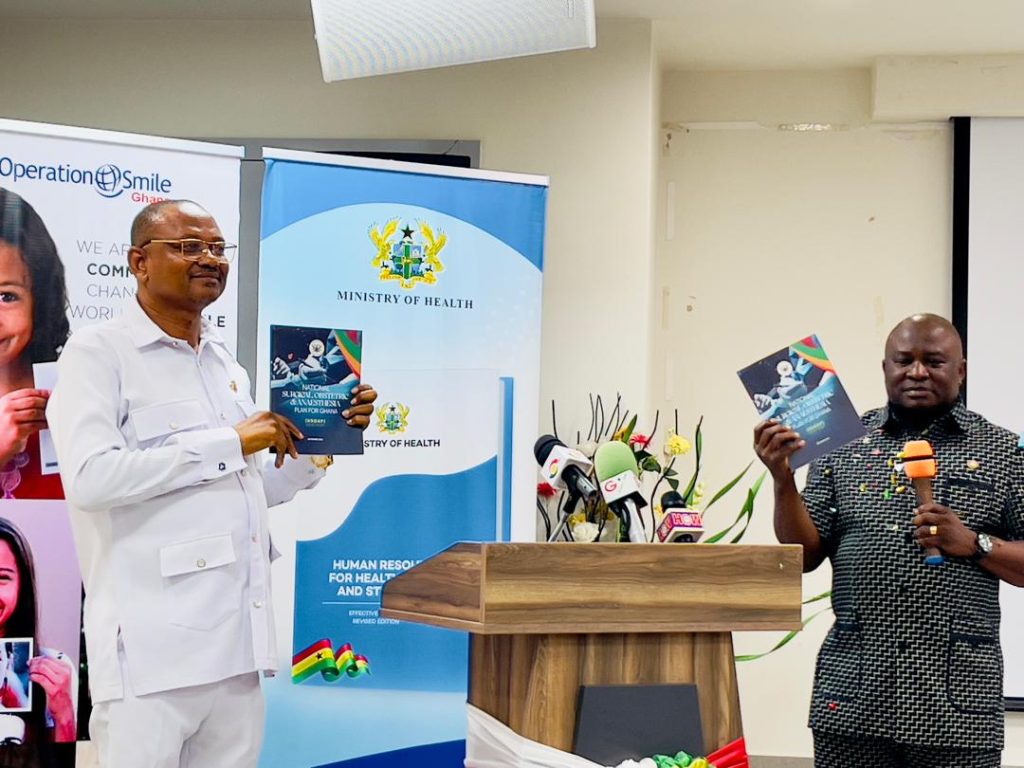By Linda Naa Deide Aryeetey
Accra Sept. 4, GNA – The National Surgical Obstetric and Anaesthesia Plan (NSOAP) was launched on Tuesday to guarantee equitable access to safe and high-quality surgical, obstetric, trauma, and anaesthesia (SOTA) care for Ghanaians.
The plan is expected to serve as a model for SOTA services in Ghana over the next five years (2025-2029), with a focus on reducing gaps in access to SOTA care through targeted investments in infrastructure at primary, district, secondary, regional, and tertiary or teaching level hospitals.
The NSOAP covers goals, strategic objectives, strategic interventions, activities, and indicators for infrastructure, workforce, service delivery, financing, information management, governance, and leadership.
Its implementation is expected to cost the country about 503 million USD over time.
Mr. Alexander Akwasi Acquah, a Deputy Minister of Health who launched the initiative in Accra, said the NSOAP was critical in addressing access to surgical care at all levels of healthcare.
He explained that the NSOAP would be executed at three levels: through a steering committee with leadership from various tiers of health care, and by the health minister.
Mr. Acquah called for multi-stakeholder collaborations, public-private partnerships, and strong teamwork at all levels of the health system to ensure the NSOAP’s effective implementation.

Dr. Opoku Ware Ampomah, Chief Executive Officer of the Korle-Bu Teaching Hospital, added that the policy was timely in prioritizing surgical care as an important element of the healthcare system.
“Presently, Ghana is performing only 30 percent of all surgical operations required across the country due to under-tooling, inaccessibility, inadequate human resource and cost of care,’ he said.
Dr. Ampomah said the West African Health Organisation’s (WHOA) recommendation was a minimum of 20 SOTA physicians per population of 100,000, but Ghana had just six for 100,000 individuals, and those professionals were unevenly spread across the country, with inadequate specialists at the district level.
He said that trauma, for example, was a silent epidemic that caused a large number of deaths, saying that, “If you look at the number of deaths that we have from trauma in a year, it exceeded the deaths from COVID-19 and it is actually taking out people who are in their prime productive years, so this plan comes at a very good time.”
Dr. Ruben Ayala, Chief Policy and Advocacy Officer at Operation Smile, a global non-profit medical organization which funded the document’s development nine years after its introduction, stressed the need for teamwork to ensure the effective implementation of the plan.
The NSOAP would help rehabilitate surgical, obstetric, and anaesthesia infrastructure at healthcare facilities, expand SOTA professional training, and improve surgical services throughout the country.
The plan includes measures to ensure the equitable distribution of needed health professionals as well as retention initiatives, particularly in marginalized areas
It also outlines strategies for leveraging technology to improve service delivery and for engaging communities for targeted outreach programs.
The plan would help resolve disparities in access to care by bringing into focus neglected surgically treatable conditions such as structural birth defects, and gender-based violence cases requiring SOTA care.
The plan is consistent with the World Health Assembly Resolution 68.15, which was adopted in 2015 and called for countries to increase emergency and essential surgical care as a critical component of achieving universal health coverage (UHC) by 2030.
GNA.